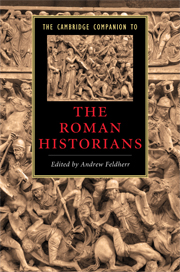Book contents
- Frontmatter
- Introduction
- Part I Approaches
- Part II Contexts and Traditions
- Part III Subjects
- Part IV Modes
- Part V Characters
- Part IV Transformations
- 20 Josephus
- 21 The Roman exempla tradition in imperial Greek historiography: The case of Camillus
- 22 Ammianus Marcellinus: Tacitus’ heir and Gibbon’s guide
- 23 Ancient Roman historians and early modern political theory
- 24 Re-writing history for the early modern stage: Racine’s Roman tragedies
- 25 The Roman historians and twentieth-century approaches to Roman history
- Chronological list of the historians of Rome
- Bibliography
- Index
21 - The Roman exempla tradition in imperial Greek historiography: The case of Camillus
from Part IV - Transformations
Published online by Cambridge University Press: 28 November 2010
- Frontmatter
- Introduction
- Part I Approaches
- Part II Contexts and Traditions
- Part III Subjects
- Part IV Modes
- Part V Characters
- Part IV Transformations
- 20 Josephus
- 21 The Roman exempla tradition in imperial Greek historiography: The case of Camillus
- 22 Ammianus Marcellinus: Tacitus’ heir and Gibbon’s guide
- 23 Ancient Roman historians and early modern political theory
- 24 Re-writing history for the early modern stage: Racine’s Roman tragedies
- 25 The Roman historians and twentieth-century approaches to Roman history
- Chronological list of the historians of Rome
- Bibliography
- Index
Summary
Despite a now substantial and ever-growing body of scholarly work on the imperial Greek historians, they remain the poor second cousins of their extant Latin counterparts. The simple fact is that Sallust, Livy, and Tacitus strike most as a better read than, for example, Appian or Cassius Dio, at least for those interested in history qua literature. In this regard Plutarch is perhaps the one worthy rival of the Latin historians, but he is not really a “historian” in the sense I employ for the purposes of this chapter. This is not merely a matter of taste; there is something intrinsically “different” about the way the three historians I discuss in this chapter - Dionysius of Halicarnassus, Appian, and Cassius Dio - think about Roman history, something that sets them apart from their Latin-writing counterparts. One distinction is obvious: they write in Greek. To be clear, when I use the term “Greek historian” I mean “a historian who writes in Greek”; these characters are inarguably Roman historians in terms of subject-matter. But apart from language, the distinctions one might draw between them and, say, Livy and Tacitus are not so clear-cut. Tacitus was an imperial senator from the provinces; so was Cassius Dio. Dionysius of Halicarnassus lived in Rome and wrote history in the Augustan period; so did Livy, who like Dionysius had no part in Roman politics. Appian was an imperial bureaucrat from Alexandria who had spent the better part of his career living in Rome.
- Type
- Chapter
- Information
- The Cambridge Companion to the Roman Historians , pp. 332 - 347Publisher: Cambridge University PressPrint publication year: 2009
- 5
- Cited by



